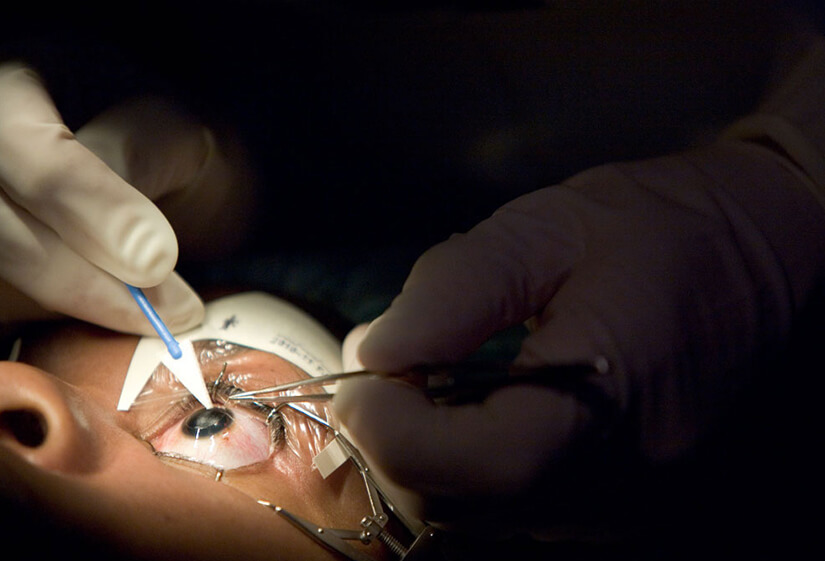INTRODUCTION:
Cataract surgery is one of the most commonly performed procedures worldwide, with millions of people benefiting from its remarkable results every year. However, despite its effectiveness, many individuals experience fear and anxiety when facing the prospect of cataract surgery. If you’re among those feeling apprehensive, rest assured that you’re not alone. In this article, we’ll delve into the causes of fear surrounding cataract surgery and provide practical tips to help alleviate your concerns.

Common Fears Associated with Cataract Surgery:
Fear of the Unknown: Uncertainty about the surgical process and its outcomes can induce anxiety.
Fear of Pain: Concerns about experiencing pain or discomfort during or after the surgery.
- Fear of Complications: Apprehensions about potential complications or adverse effects associated with the procedure.
- Fear of Vision Loss: Worries about potential worsening of vision or permanent damage to eyesight.
Tips to Overcome Fear of Cataract Surgery:
Educate Yourself: Knowledge is a powerful tool in alleviating fear. Take the time to research the cataract surgery process, including preoperative preparation, the surgical procedure itself, and post-operative care. Understanding what to expect can help demystify the experience and reduce anxiety.
- Consult with Your Ophthalmologist: Schedule a consultation with your eye surgeon to discuss any concerns or questions you may have about cataract surgery. Your ophthalmologist can provide personalized information, address your fears, and offer reassurance based on your specific circumstances.
- Seek Support: Don’t hesitate to lean on friends, family, or support groups who have undergone cataract surgery. Hearing about their positive experiences and outcomes can provide encouragement and emotional support during your journey.
- Focus on the Benefits: Remind yourself of the potential benefits of cataract surgery, such as improved vision, enhanced quality of life, and greater independence. Keeping a positive mindset can help shift your focus away from fear and towards the positive outcomes awaiting you.
- Practice Relaxation Techniques: Incorporate relaxation techniques such as deep breathing, meditation, or visualization into your daily routine to help manage anxiety leading up to the surgery. These techniques can promote a sense of calmness and control, easing your fears.
- Trust Your Medical Team: Remember that cataract surgery is a routine procedure performed by skilled professionals. Trust in the expertise of your medical team and their commitment to your well-being. Openly communicate any concerns you may have, and trust that they will address them with care and competence.
Conclusion:
Facing cataract surgery can be daunting, but with the right mindset and support, you can overcome your fears and experience the life-changing benefits of improved vision. By educating yourself, seeking support, and focusing on the positive outcomes, you can navigate the surgical process with confidence and peace of mind. Remember, your ophthalmologist is there to guide you every step of the way, ensuring a safe and successful journey towards clearer vision. Don’t let fear hold you back from reclaiming your sight and enjoying a brighter future.
Author Details:
Dr. Sushruth Appajigowda holds a prominent position as a Cornea, Cataract, Glaucoma, and LASIK Surgeon in Bangalore. He serves as the chief Cataract and Refractive surgeon at Vijaya Nethralaya Eye Hospital, Nagarbhavi Bangalore. Renowned as one of the finest LASIK surgeons nationwide, he brings with him over 12+ years of experience across multiple LASIK platforms, including ZEISS, ALCON, SCHWIND, AMO, and Bausch and Lomb. Having successfully conducted over 5000 LASIK procedures, Dr. Sushruth holds the title of a Certified Refractive Surgeon and a Fellow of the All India Collegium Of Ophthalmology. Furthermore, he stands as a distinguished speaker at various National and International Forums, using his expertise to guide you in selecting the most suitable procedure based on your health requirements.

http://vijayanethralaya.com/link-in-bio/
FAQ:
1. Is cataract surgery painful?
No, cataract surgery is typically painless. The procedure is done under local anesthesia, which numbs the eye. You may feel pressure, but no sharp pain.
2. How long does the surgery take?
Cataract surgery usually takes about 15 to 30 minutes. It’s a quick procedure, and most patients go home the same day.
3. What can I expect after surgery?
You may experience mild discomfort or irritation in the eye, but this is temporary. You’ll be given eye drops to aid healing and reduce inflammation.
4. How soon will I see improvement?
Vision improvement can often be noticed within a day or two after surgery, though full recovery may take a few weeks.
5. Are there any risks associated with cataract surgery?
Like any surgery, there are risks, including infection, bleeding, or retinal detachment, but these are rare. The procedure is very safe with a high success rate.
6. How can I manage my fear before surgery?
Talk to your surgeon about your concerns. Understanding the process and knowing what to expect can help ease your fears. Deep breathing, relaxation techniques, and bringing a supportive friend or family member may also help.
7. Is cataract surgery really necessary?
If cataracts are affecting your quality of vision and daily life, surgery is often the best solution to restore clear vision and improve your overall well-being.












